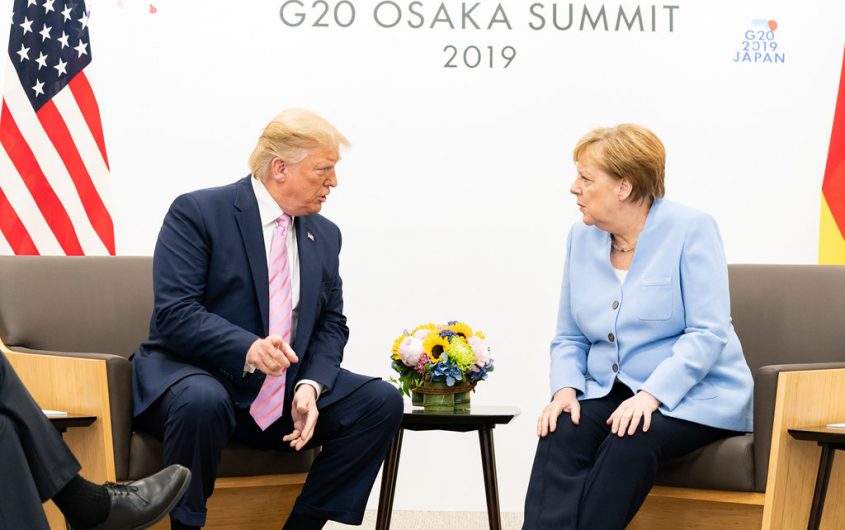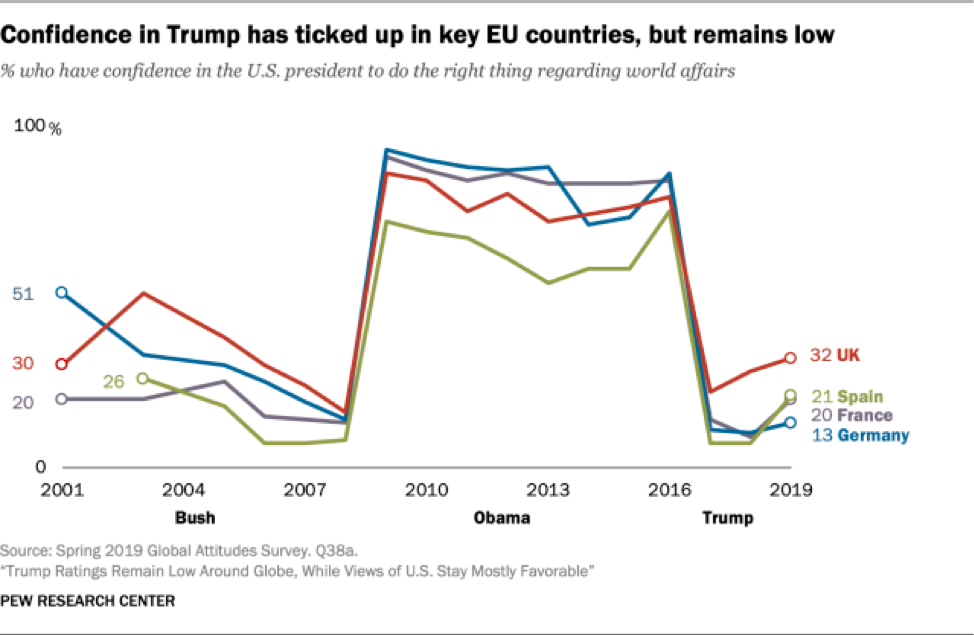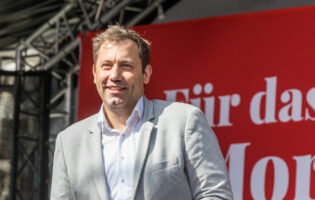
Official White House Photo by Shealah Craighead via Flickr
Is Germany Trolling Trump?

Nick Lokker
Georgetown University
Nick Lokker is a graduate student at Georgetown University’s Walsh School of Foreign Service, where he is pursuing his MA in German and European Studies. He has an academic focus on transatlantic security policy and EU-Russia relations. Nick previously worked for AICGS as a research intern during the summer of 2020. His duties included assisting the AICGS president and fellows with research as well as writing for the AICGS website.
Nick's other work experience includes internships with the Center for a New American Security's Transatlantic Security Program, the Center for European Policy Analysis, and the European Parliament. He speaks French, Spanish, and some German and Russian.
On May 29, 2020, Germany unveiled its motto for the country’s upcoming presidency of the Council of the European Union, which will begin on July 1 and last through the end of the year. Such an announcement would normally attract little attention; however, the particular phrasing of the German slogan has caused some observers to do a double take.
“Gemeinsam. Europa wieder stark machen.” These words are best translated into English as “Together. Making Europe strong again.” Although the official English version of the motto is “Together for Europe’s recovery,” the resemblance to Donald Trump’s signature “Make America Great Again” is nevertheless unmistakable.

At first glance, this deliberate imitation may seem puzzling. After all, Donald Trump is no hero in Germany. Throughout his term as president, Trump has received consistently negative approval ratings from the German public. In fact, as recently as January 8, only 13 percent of Germans expressed confidence in President Trump to “do the right thing” in international affairs. Although this figure actually represents a slight increase in approval since the beginning of Trump’s term, it nevertheless marks a stark contrast with the 86 percent of Germans who had confidence in President Obama at the end of his second term in 2016.
Perhaps, then, we should consider the possibility that Germany’s Trumpian slogan is intended to troll the American president, rather than to pay tribute to him. A new term for the internet age, trolling may be defined as “intentionally antagonizing others online by posting inflammatory, irrelevant, or offensive comments.” Though it originated on forums and message boards, it has since entered the political mainstream—with some even calling Trump himself “The World’s Greatest Troll.” From his insistent suggestion that Barack Obama was not born in the United States to his adoption of nicknames for political opponents such as “Sleepy Joe” and “Crooked Hilary,” the current president seems to take satisfaction in provoking others.
It is not difficult to imagine Angela Merkel wanting to have some modest fun at Trump’s expense. The two leaders have had a frosty relationship over the past three and a half years, consistently butting heads over a range of issues including German defense spending, the Nord Stream 2 gas pipeline, and Merkel’s recent decision not to attend the G7 summit originally scheduled for late June, among many others. While policy disagreements are to be expected between any two leaders, Trump has escalated these disputes to a personal level on multiple occasions, for instance saying in 2018 that Germans were “turning against their leadership” due to the migration crisis and reportedly even once throwing Starburst candies at Merkel during a G-7 meeting.
Of course, the German government would never admit to mocking Trump. Steffen Seibert, Merkel’s spokesperson, explained on Twitter that the motto (together with its Mobiüs strip logo) represents the need for “joint action arising from the diversity of the EU.” During a press conference in Berlin, he emphasized Germany’s planned efforts “to ensure that Europe regains economic strength and competitiveness.” Foreign minister Heiko Maas elaborated in an official statement: “Guiding Europe out of the crisis—this will be the defining task of our Presidency.” Notably absent were any references to the United States or to Donald Trump.
Any feigned ignorance aside, the slogan is a clear sign of the extent to which the German-American alliance, as well as the larger transatlantic relationship, has deteriorated in recent years. Instead of being based upon deep mutual respect, transatlantic relations are now often characterized by contempt and pettiness on both sides. The irony is that without each other, American and European desires for “strength” or “greatness” are destined for nothing other than failure.









